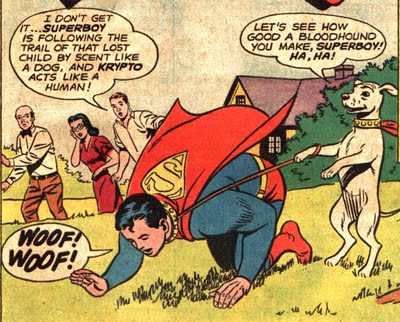Mark Doolittle, local historian: It really all started with the tourist trade. People started showing up from all over the country all wanting to see the “birthplace of Superman”. At first it was just snowbirds, retirees, people passing through on road trips, but word got around and the economy started to pick up.
Bill Long, mayor: Of course, initially, it seemed like a godsend. Smallville is a farm community, and you know how badly family farms were doing around that time. When that tourist money started rolling in, it was like it fell straight from heaven. No blasphemy intended, of course. Heh heh.
Rich Ross, feed store operator: That jackass Long starts spending money like tomorrow’s never gonna come. We used to have this big sign on the water tower, you know, said “Welcome to Smallville, Birthplace of SUPERMAN!”. Pete Farleigh from over to Ennisville painted it hisself. We spent the rest of the municipal budget on sensible things like farm subsidies and public works but now all of a sudden Mayor Numbnuts has hired some big P.R. firm out of Metropolis to run a ad campaign.
Martha Kent, housewife: Well, I thought it was very nice to see our town on the back cover of the road atlas.
Rich Ross: Sure, that was high-larious. I loved seeing a bunch of accountants from Kyoto or Prague or wherever the Christ they was from trampling all over my soy fields so they could get a snapshot of where Superboy took his first crap.
Bill Long: Well, of course, it was great. At first, I mean. We didn’t have a problem at all until they started showing up. The blacks. You aren’t going to write that down, are you?
Mark Doolittle: It was inevitable as the seasons. More and more tourists started showing up from all over the country, and eventually the world. All the money dazzled the townsfolk, but it soon became clear that the small population of Smallville couldn’t possibly support the huge labor force that goes with a strong service-based economy. The mayor was short-sighted, of course, but it was too late for recriminations at that point. There was no going back to the way things were.
Stephen Keller, real estate agent: We had to attract workers for the hotels, gift shops, the Superman Museum, all those things. Rent went way down and wages went way up so we could lure service workers away from the cities. At the same time, they started the riverboat casino to make up for all the tax money the mayor spent on promotion and advertising.
Rich Ross: Next thing you know, they’re callin’ us “Vegas in a Cornfield”. That’s when I moved the family to Orem, Utah.
Lena Colby, entrepreneuse: I suppose people in the big city have better things to do with their law enforcement resources, like persecuting innocent, innovative venture capitalists.
Bill Long: Oh, Lena says all sorts of things. But in truth, the gang problem got way out of hand very quickly. With the problem with, well, you know how those people are. Drugs.
Peter Hellman, sheriff’s deputy: The drugs weren’t the worst of it. I mean, hell, it was no secret that even Pa Kent grew a little weed to make ends meet during the lean years. The gangs were the real problem. Between the coke trade and the mob running the casinos, it was awful. And Superman was no help; he never even came within a hundred miles of Smallville. Kryptonite grows around here like mushrooms. All the gangbangers wear it in their teeth, on their jewelry, on the hubcaps of their low-riders, everywhere. You should see downtown at night, it looks like the face of one of those glow-in-the-dark watches. So, we tried to get our own superhero, but that didn’t work out so well.
Rich Ross: The hell even is a Black Orchid, anyway? Thanks for the whole two weeks of help, plant lady.
Jerrald McQueen, concierge: Shit, man. Lemme tell you somethin, this place was a fuckin dump when I moved here. All them fuckin crackers complain about the seasonal workers but they take our money sure nuff. Let they cracker asses move away; maybe then we can get some decent nightclubs and restaurants roun here. You know the school here is actually a little red schoolhouse? Unbelievable. 160 students stuffed into one room and Lana fuckin Lang aint never even heard of Black History Month. When Hustler did “Large, Latina and Lovely in the Heart of the Midwest” the city fathers about shit.
Mark Doolittle: Ivytown, Blue Valley and Littleville all saw an increase in white population directly concomitant to the loss of the white population in Smallville, and inversely proportionate to the growth of the city as a whole.
Bill Long: You’re not really going to print what I said, are you? Seriously. This is an election year.
Peter Hellman: I know most of the old families have moved away. Sometimes I wonder why I stick around myself, but I guess I’m still in love with the old ways. And…I guess I keep hoping that somehow he’ll come back, and put everything right. Yeah. This city needs Lex Luthor now more than ever.

